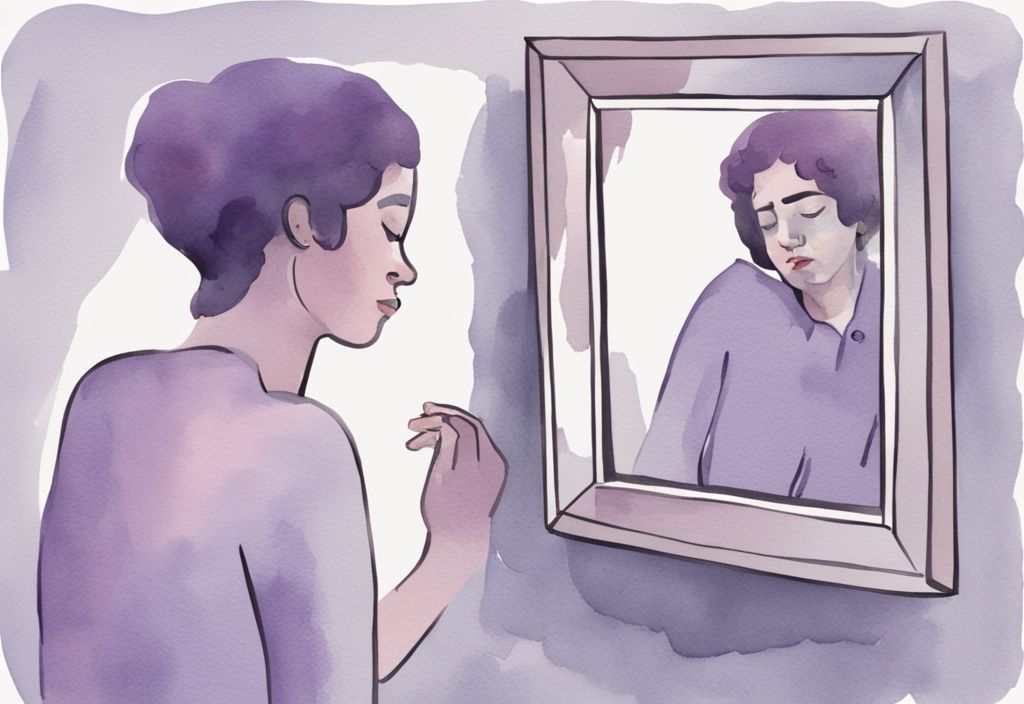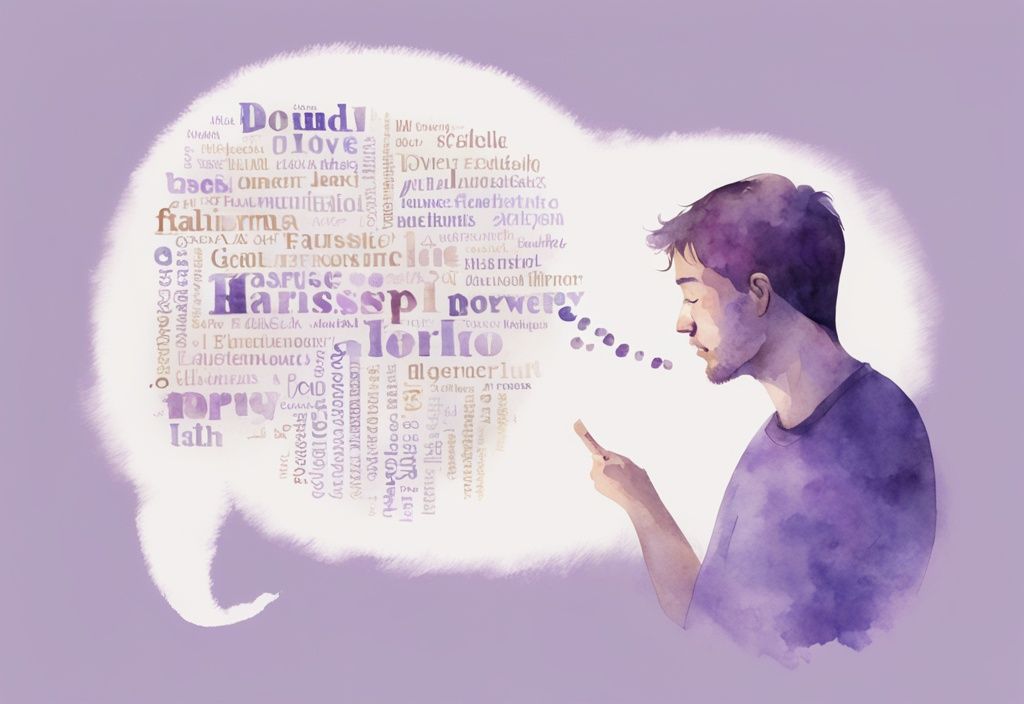Understanding Narcissist Playing Victim: Unmasking the Tactics
Are you struggling with a narcissist playing the victim? You’re not alone. Too often, narcissists manipulate circumstances and emotions, casting themselves as victims to evade blame and elicit sympathy. This bewildering tactic can leave you flustered, shouldering guilt and emotional exhaustion. As someone who has been in your shoes, I understand your struggle.
This article shines a spotlight on the narcissistic ploy of playing victim. It breaks down its psychological underpinnings, the common manipulation tactics used, and their profound impacts on the unsuspecting targets.
You’re not just reading to understand; you’re here to regain control. By arming yourself with knowledge and strategies to enforce boundaries and safeguard your mental health, you’re taking the crucial first step towards healing.
What Does It Mean When a Narcissist Plays the Victim?
Definition and Overview of Narcissistic Victimhood
A narcissist playing victim craftily uses manipulation to attract sympathy. By exaggerating or fabricating instances of mistreatment, they skillfully cast themselves as the wronged party. This facade of victimhood becomes a shield, deflecting accountability and placing blame on others.
Relatives and close associates of individuals with Narcissistic Personality Disorder (NPD) often observe a pervasive victim mentality. This behavior aligns with key symptoms and traits of NPD, such as an insatiable need for admiration and a profound lack of empathy.
Reasons Why Narcissists Play the Victim
Understanding why a narcissist adopts the victim role can be complex. Several motivations underscore this behavior:
- Sense of Entitlement: Narcissists are convinced they deserve special treatment and react intensely when their lofty expectations aren’t fulfilled.
- Avoiding Responsibility: By blaming others and claiming the victim role, they deftly sidestep accountability for their actions.
- Ego Protection: Assuming the victim’s mantle guards their delicate egos from shame and insecurity.
- Maintaining Control: This behavior allows them to manipulate circumstances and retain control over others.
- Validation and Support: Whether consciously or unconsciously, narcissists seek validation and emotional support from their surroundings by portraying themselves as victims.
The Psychology Behind Narcissistic Personality Disorder (NPD)
Narcissistic Personality Disorder (NPD): An Overview
Narcissistic Personality Disorder (NPD) is a complex mental health condition marked primarily by an inflated sense of self-importance. Those with NPD exhibit a pronounced need for admiration and often lack empathy for others. It’s crucial to understand that NPD is not merely a personal choice or character flaw but a diagnosed mental health issue. This condition significantly influences how individuals perceive themselves and interact with others, often leading to problematic relationships and behaviors.
Key Traits of NPD Relevant to Playing the Victim
Understanding the connection between NPD and the behavior of playing the victim can shed some light on why those with the disorder behave the way they do. Key traits of NPD that play into this behavior include a sense of entitlement, projection, blame-shifting, and low empathy.
Sense of Entitlement and Grandiosity
Individuals with NPD harbor a deep sense of entitlement, believing they deserve superior treatment and privileges. When these expectations are unmet, they often respond with frustration or anger, perceiving any form of opposition as unjust.
This grandiosity isn’t just about feeling special; it’s about an ingrained belief that they are exceptional and deserve recognition and deference from others.
Projection and Blame-Shifting
The tactic of projection involves narcissists attributing their own undesirable traits, feelings, or actions to others. For example, if they feel insecure, they might accuse someone else of being insecure.
Blame-shifting, on the other hand, is a strategy used to avoid taking responsibility for their actions. By consistently accusing others of causing their problems, they deflect any accountability and maintain their sense of victimhood.
This behavior not only protects their fragile self-esteem but also places undue burden on those around them.

Low Empathy and Lack of Self-Awareness
Narcissists often struggle to understand or consider the feelings and perspectives of others, a key marker of low empathy. This inability can lead them to genuinely believe in their victimhood, as they are incapable of seeing the situation from an outside perspective.
Coupled with a lack of self-awareness, they fail to recognize how their actions impact others. This combination means that even when they are the ones causing harm, they genuinely perceive themselves as the aggrieved party.
Common Manipulation Tactics Used by Narcissists
DARVO: Deny, Attack, Reverse Victim and Offender
Imagine finding yourself utterly bewildered when a narcissist playing victim uses DARVO. It starts with their adamant denial of any misconduct. They then launch an attack on you for bringing up the issue in the first place. The final stroke—the masterful reversal of roles—positions them as the wronged party. This isn’t just a ploy; it’s a calculated move designed to disorient and confuse you, making it difficult to stand by your reality and your truth.
Gaslighting and Reality Twisting
Gaslighting is another insidious manipulation technique where the narcissist playing victim invalidates or whitewashes their harmful actions. They make you question your reality, adeptly twisting events to cast themselves as the ones who are suffering. Such behavior doesn’t merely chip away at your confidence—it plants seeds of deep self-doubt and confusion. Before you realize it, you’re more prone to their manipulation, struggling to trust your perceptions.
Smear Campaigns to Gain Sympathy
Through smear campaigns, narcissists further manipulate by spreading lies or negative information about you. This move helps them preserve their façade while painting themselves as victims. Their goal? To gain empathy and support from others, effectively turning people against you and ensuring you feel isolated. These campaigns cement their control over the narrative and reinforce their image as the person who has been wronged.
The Impact on Victims and Relationships
Navigating a relationship with a narcissist playing the victim can have profound and lasting effects on both the individuals and the dynamics at play. The subtle and persistent manipulations disrupt emotional stability and create an environment rife with confusion and mistrust.
Emotional Distress and Self-Doubt
As you grapple with the behaviors of a narcissist playing the victim, the emotional whirlpool can be overwhelming. Their relentless tactics of manipulation and blame-shifting plunge you into a storm of confusion, twisting your perception of reality. It’s a disturbing dance—each move designed to erode your self-confidence and sow the seeds of chronic emotional distress.
Guilt, Blame, and Resentment in Interpersonal Relationships
The accusations hurled by a narcissist often land heavily, crafting a burdensome sense of guilt and self-blame that you struggle to shake off. Despite being manipulated, you begin to doubt your own integrity. This unjust emotional labor builds layers of deep-seated resentment over time, especially as your genuine needs and feelings are consistently sidelined. The ongoing rigmarole of emotional manipulation gnaws away at the very foundation of trust and mutual respect that any healthy relationship should be built upon.
Coping with Confusion and Maintaining Boundaries
Fortifying your emotional well-being against the tumultuous influence of a narcissist playing the victim is crucial. Setting and maintaining clear boundaries becomes a protective shield, allowing you to reclaim a sense of clarity and control over your own emotions and actions. Understanding these narcissistic manipulation tactics is like finding a map in a labyrinth—it guides you back to your own truth. By identifying and enforcing these boundaries, you can deter further manipulative behavior and foster a healthier mental landscape.
Recognizing When a Narcissist is Playing the Victim
Learning to identify the behavior patterns of a narcissist playing the victim can be both a revelation and a relief. This section explores the signs and behaviors that often manifest when a narcissist adopts a victim stance, highlighting how these tactics are employed to manipulate and control those around them.
Key Signs and Behaviors
Constant Self-Pity
Constant self-pity is a hallmark of a narcissist playing the victim. It’s like they carry a cloud of gloom everywhere they go, always ready to rain on someone’s sunny day. This behavior is a strategic play to evoke sympathy and shift the focus onto themselves.
- Narcissists frequently express how unfairly they’ve been treated, crafting a narrative where they’re perpetually in the wrong place at the wrong time.
- Utilizing self-pity effectively, they often leave others feeling guilty or compelled to offer support, transforming any interaction into one where their needs are paramount.
Exaggeration or Fabrication of Abuse
Narcissists have a flair for exaggeration or fabrication of abuse. Imagine a director embellishing every scene to ensure their story grabs the spotlight; that’s how a narcissist operates. They meticulously construct tales of mistreatment to win the audience’s sympathy and attention.
- They might spin exaggerated or completely concocted stories of abuse, portraying themselves as ultimate survivors in a world that’s relentlessly cruel to them.
- By amplifying their victimhood, they engender doubt in others, making those around them question their perceptions and observations.

Shifting Blame and Manipulating Emotions
A narcissist is adept at shifting blame and manipulating emotions. Consider them artists, but instead of painting with colors, they use guilt and responsibility to contour their narratives. This allows them to remain untarnished in their own eyes while discrediting others.
- They deftly shift blame for any problems onto others, never accepting responsibility for their actions. This redirection confuses their targets and absolves them from any fault.
- Emotional manipulation is their tool of choice, making others feel guilty for questioning their motives or doubting their narratives, thereby binding their targets closer in a web of culpability.
Strategies for Dealing with a Narcissist Playing the Victim
When you find yourself entangled with a narcissist playing the victim, it’s vital to have clear strategies to protect your emotional wellbeing. Here are some approaches to help you navigate this challenging dynamic.
Maintaining Distance and Practicing Detachment
- Detachment is essential to prevent getting trapped in the narcissist’s fabricated victim narratives. Imagine an actor playing their role—they exaggerate and distort reality to fit their script.
- By maintaining an emotional distance, you not only safeguard your mental health but also reduce emotional stress. Think of it as creating a protective bubble around your heart.
- Engaging with them often fuels their need for attention and manipulation. Picture pouring water into a bottomless well—the more you give, the more they demand.
Setting Healthy Boundaries
- Identify behaviors that are unacceptable and enforce limits consistently. This isn’t just about saying “no”; it’s about reclaiming your right to respect. Establishing boundaries is like building sturdy fences around your personal space.
- Firm boundaries communicate what you will and will not tolerate, deterring the narcissist from overstepping. Think of it as drawing a clear line in the sand.
- Clear boundaries help you regain a sense of control in interactions with the narcissist, restoring balance and peace to your life.
Using the Grey Rock Method
- This strategy involves remaining neutral and unemotional in interactions to diminish the narcissist’s manipulative efforts. Picture yourself as a grey rock—uninteresting and unresponsive in their eyes.
- Offering brief, factual responses without displaying emotions helps avoid giving them the reaction they seek. Imagine replying with a simple nod instead of a heated debate.
- Being uninteresting to the narcissist reduces the emotional fuel they thrive on, essentially starving their need for drama and attention.
Documenting Experiences and Recognizing Patterns
- Keeping a journal can validate your feelings and experiences, helping you recognize patterns in the narcissist’s behavior. Think of it as connecting the dots in a puzzle, revealing the bigger picture.
- Documentation provides clarity and prevents you from doubting your perception of events. This can be empowering, especially when reality becomes blurred.
- Such records can be beneficial in legal disputes or when consulting with therapists or legal professionals. It’s like having a reliable witness on your side.
Considering a No-Contact Approach When Necessary
- In extreme cases, cutting off all contact with the narcissist may be the most effective way to protect yourself. It’s as if you’re closing a door to a toxic room and choosing not to re-enter.
- No-contact shields you from continual manipulation, emotional abuse, and mental exhaustion. Imagine yourself walking away from a storm towards a place of calm and safety.
- This approach ensures that you can focus on healing and rebuilding your life without the narcissist’s interference, enabling you to rediscover peace and personal strength.
Seeking Support and Recovery
In the journey of healing from the profound impact of encountering a narcissist playing the victim, it’s essential to understand the multifaceted approaches available. These pathways toward recovery encompass professional therapy, community support, and legal guidance.

Importance of Professional Help and Therapy
Dealing with the aftermath of a narcissist playing the victim can unravel a tapestry of complex emotions. Seeking professional therapy becomes a lifeline in such turbulent times. Therapeutic support provides a sanctuary to explore and process these intricate feelings. Therapists with expertise in narcissistic abuse are especially equipped to comprehend and address the unique hurdles victims encounter. They craft personalized strategies aimed at rebuilding your resilience and self-esteem, essential components of recovery. Therapy isn’t just about coping; it’s about reclaiming control and fostering meaningful healing.
Joining Support Groups and Building a Community
Isolation often shadows those affected by a narcissist playing the victim. Joining support groups can break this isolating cycle, offering a beacon of connection and understanding. These groups create a safe haven where you can share your experiences without judgment, find validation, and receive genuine empathy. If you’ve ever wondered, are narcissists capable of love, discussing such topics in these groups can also provide valuable insights and perspectives. The power of community lies in its ability to cultivate mutual understanding and shared coping strategies. Engaging with others who truly grasp your struggles can be profoundly empowering, helping to transform feelings of loneliness into a shared journey toward healing. Connection and solidarity in these groups pave the way for a more resilient recovery process.
Legal Considerations in Separation from a Narcissist
When separating from a narcissist playing the victim, the path can be laden with legal obstacles, especially where children or shared assets are concerned. Securing legal counsel is crucial in these scenarios. Experienced legal experts will safeguard your rights and guide you through the complexities of custody arrangements, property division, and other contentious issues. Understanding your legal rights and options not only provides a sense of control and security but also helps minimize potential conflict. Legal guidance ensures that the separation process is managed efficiently and fairly, contributing significantly to your peace of mind during such a tumultuous time.
Conclusion
Key Takeaways for Managing Relationships with Narcissists
Understanding how to manage relationships with a narcissist playing the victim starts with recognizing their manipulation tactics and motivations. Narcissists often fabricate or exaggerate their victimhood to shift blame and control others. This is their way of deflecting responsibility and creating a smokescreen that leaves you doubting yourself.
Recognizing these manipulative behaviors is crucial. It’s essential to acknowledge that you can’t fix or save the narcissist. Instead, focus on your own mental and emotional health. This isn’t about abandoning the narcissist but about safeguarding your well-being in the face of their influence. Think of it as putting on your own oxygen mask before assisting others — you can’t help anyone if you’re not okay yourself.
Emphasizing Self-Care and Well-Being
When dealing with a narcissist playing the victim, self-care is your lifeline. Engage in activities that uplift your mental and emotional state. This might include mindfulness practices, therapy sessions, or delving into hobbies that bring you joy and fulfillment. Imagine these practices as building a fortress around your well-being, keeping their toxic behavior at bay.
Equally important is setting and maintaining boundaries. Understand that detachment from the narcissist isn’t abandonment—it’s a vital step towards self-preservation. By drawing clear lines and prioritizing your self-care, you shield yourself from their harmful tactics and ensure your peace of mind.
Creating this balance allows you to navigate the challenges posed by a narcissist playing the victim while maintaining your mental and emotional health. This approach empowers you to live authentically and healthily despite the manipulative dynamics at play.
FAQ
How Can I Tell if a Narcissist is Playing the Victim?
Spotting when a narcissist is playing the victim can be challenging, but there are telltale signs. Look for their relentless expressions of self-pity and frequent exaggeration of troubles or past abuses. They often blame others for their misfortunes, shifting responsibility to avoid accountability. This behavior is a calculated attempt to draw sympathy and manipulate your emotions.
What Are Common Tactics Narcissists Use to Manipulate Others?
Narcissists deploy various manipulative tactics to maintain their control. One prominent strategy is DARVO, where they Deny an offense, Attack the victim, and then Reverse Victim and Offender roles. Gaslighting is another tool, where they distort your reality to make you question your own judgement. Smear campaigns and emotional manipulation also serve to confuse and disorient true victims, all while preserving the narcissist’s desired image.
Why Do Narcissists Need to Be the Victim?
Playing the victim allows a narcissist to achieve multiple objectives. It’s a defensive mechanism to evade responsibility and avoid facing their own shortcomings. By positioning themselves as the victim, they garner sympathy and validation from others, deflecting blame and criticism. This not only protects their ego but also enables them to maintain control over those around them.
How Can I Protect Myself from a Narcissist’s Manipulation?
Protecting yourself requires vigilance and firm boundaries. Establish clear limits on what behavior you will tolerate and practice emotional detachment to prevent yourself from being drawn into their drama. Documenting your interactions can provide clarity and serve as evidence if needed. Most importantly, seek support from trusted friends, family, or professionals who can help you navigate these challenging dynamics.
Is It Possible to Change a Narcissist’s Behavior?
Changing a narcissist’s behavior can be incredibly difficult, largely due to the deeply ingrained patterns of Narcissistic Personality Disorder (NPD). While therapy or professional help might offer some avenues for change, it’s crucial to manage your expectations. Prioritize your mental health and well-being over the exhausting and often futile task of trying to change a narcissist.
What Are Effective Coping Strategies for Dealing with Narcissists?
Effective coping strategies are essential for minimizing the emotional toll of dealing with a narcissist. Maintaining a safe distance, where possible, can be beneficial. The grey rock method, which involves becoming emotionally non-reactive and uninteresting to the narcissist, can also help. Setting firm boundaries is crucial, and in some cases, you might need to consider going no-contact to safeguard your emotional health.














Post Comment